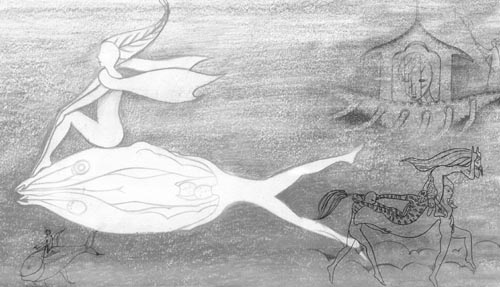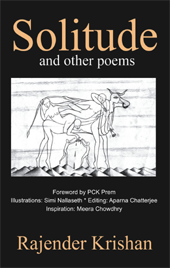Jan 29, 2026
Jan 29, 2026

The poems of Rajender Krishan are written in the realm of the abstract. The running spirit of his poems is a fascination for abstract thoughts, ideas, fancies and yearnings. The collection ‘Solitude and other Poems’ does not contain a single poem that deals with every day experience of life, the relationships or something even remotely earthly. The whole canvas is devoted to the abstract. Solitude, void, emptiness, words, sigh, freedom, loneliness, atman, raga, identity, breath, journey are the themes and concerns of the poems of Krishan.
The book begins with the analogy between life and onion. Layer after layer, the bulb gets peeled off, the odor spreads, tears come and at the end nothing remains. Life can be felt; not touched. Life cannot be caught; it can only be experienced.
The title poem of the book, ‘Solitude’ is about churning of ideas. Solitude remains forever alluring and forever evasive.
I have tried hard
to discover solitude,
but it remains elusive
 Then we come to the unique phenomenon of breath. Breath has been identified with ‘prana’. Breath is the very life force of life. The poet raises the natural questions that if breath is free; why do we have other boundaries, other fences. The poem touches the post-modern concern of identity crises. When we differentiate, a human being from another human being, problems will naturally crop up. The poem Speech is unique in the sense that it finds speech insufficient. Silence is energizing to the basic life force ‘prana’; speech is taxing.
Then we come to the unique phenomenon of breath. Breath has been identified with ‘prana’. Breath is the very life force of life. The poet raises the natural questions that if breath is free; why do we have other boundaries, other fences. The poem touches the post-modern concern of identity crises. When we differentiate, a human being from another human being, problems will naturally crop up. The poem Speech is unique in the sense that it finds speech insufficient. Silence is energizing to the basic life force ‘prana’; speech is taxing.
The poem grows the philosophical area which declares that the speech is irreversible and therefore we must be careful in using words in any form. But the best lines of the poem are the concluding ones:
When will I embrace
the wisdom of this science?
The poem ‘Hunger’ uses the word hunger symbolically. It stands for hunger of all types. Hunger is at the root of activity. Each and every activity springs from one kind of hunger or another. It is hunger which drives one on. Satisfaction is only a theory or what the poet calls in a beautiful phrase, ‘theorized sojourn’.
The poem ‘Lines’ automatically goes to the lines of destiny. We bring the lines from the previous birth and move through the illusion called Maya and try to attain the ultimate peace ‘nirvana’. We are just one small part of a very long chain. We are here to perpetuate ‘Sanskar.’ The poem subtly hints at the three factors that decide the results of life – destiny, Karma (action) and faith.
The poem ‘Realization’ is about the craving of self to identify with big and immense things like forest, sky and ocean. The soul wants to merge in the ocean of the super soul. It’s a very beautiful, subtle, suggestive, small poem.
Seashore
Moistened sand
Tidal ebb and flow
Participating
Lunar Beams
Alluring kiss
Tidal festivity
is the Genesis
of the act
“I” dissolve
and realize
the eternal Self
Hari Om Tat sat
Formless fathomed!
The poem ‘Crossroads’ is reminiscent of Robert Frost’s ‘the road not taken’ where the poet points out the value of the path chosen and how it makes all the difference in life. The poet goes on to list all the conflicts that are at the center of contemporary, urban existence. The poem is pregnant with various themes and thoughts. When the mind is troubled, the solace is in the mother figure.
Whenever these questions
pester me
- and this happens often -
I take refuge
in the gleaming eyes
and serenity
of my grandmother
framed in the photograph.
that adorns my work desk
The words of the grandmother are the mantra. We reap what we sow − this is the eternal law of Karma. We have to be upright always. It is the path chosen by the person that decides his end.
I find a childlike simplicity in the poem ‘Words’. It is very touching. Just as a child is confused with various messages from all sides; the poet is also mystified and perplexed. The end of the poem is remarkable where the poet is fed up with words, words and more words and wants all talk to be stopped.
Kabira said, ‘Beg Not’
Christ said, ‘Cheat Not’
Amma said, ‘Hate Not’
Abba said, ‘Worry Not’
Simply tread the properly chosen path
Sensing failure, ‘Fear Not.’
But every time I try to understand
or express the core thought
a caravan of words just comes along
populating the page
It perhaps has something to do
with the unfulfilled appetite
of the contemporary creed
manifesting forever
as tempting greed
else
Living the ideals would have been
so simple and may be
instead of so much gabbling
I would have said :
“Conform, Talk Not.”
The next poem ‘Predator’ portrays Time as the eternal predator. The lines bring to mind Grey's lines where he says that the powerless and the powerful both will go to the grave; it’s only a question of time.
The poems in this collection show an obsession of the poet with inner recesses of the self. Almost all the poems are of the introspecting, thinking type.
The next poem ‘Freedom’ is about the yearning of the individual to be free from show. All our life we try to become what we are not. To be free from this pressure is freedom. The poem ‘What I am?’ is about identity as the title obviously suggests. It poses the permanent question ‘Who am I?’ The self is a bundle of contradictions. We have friends but where are they when we need them. Where are we when our friends require us? Sometimes we do not realize the place and importance of those who are very close to us. In all these processes the definition of self is lost. We keep acting according to the situation and become a spectator of our ‘self’. I am very noble, very good, very idealistic, religious, God-fearing and very heroic in certain situations to certain people. I am very cruel, cheating, lying and corrupted in certain situations to certain people. Who am I?
‘A Raga is Born’ is one of the most soft poems of this collection. Music leads to God. The mood of the Raga is miraculously caught in the poem.
A confluence occurs, when
The informant ear
get attentive on the rhythm
emanating from breathers;
The surveillance of eyes
is alert to witness -
Shiva's subliminal glory;
The breath orchestrates
for the voice
to articulate the word;
And when the mind
seated on this confluence
governs with discipline;
The Sovereign manifests
A Raga is born
Rajender Krishan has interpreted a Hindu obligation is his own manner. He has redefined the needs of religion according to the times in which we live. When we attach religions significance to some activity we build faith and it really works. The obligation of a Hindu is to plant saplings. Trees are our path to nirvana.
The eternal philosophy of living in the present comes in the poem ‘Here and Now’. The eternal philosophy of ‘now’ is ever so easy to articulate and ever so difficult to practice.
The next poem ‘Blessed in the Emptiness’ is about searching the purpose of life in emptiness. The void is valuable because it contained latent energies. The poem ‘Tat Tvam Asi’ again underlines the timeless philosophy that the individual is "bliss". The individual is ‘free’; only the individual does not know it. The poem ‘Mirror’ simply says that we may hide things from the world; we may hide things from ourselves but we cannot hide things from the mirror (the other self) because the mirror says it all. The poem ‘Dominance’ is about the two selves of the same person; one self is free, the other is conscious of identity and obligations. The poem ‘Light and Dark’ is about the timeless principle that light is light because there is darkness. Light and brightness cannot be defined if there is no darkness. Definition of illumination comes by its comparison to darkness. Both the aspects are important.
The poem ‘Renaissance’ is about being born again; free from the burden of the past. The poem ‘Buddha’ effectively points out those two millenniums ago and now the prayers of the human race remains the same ‘Compassion, love, brotherhood and peace.’ There is hardly any progress. The poem points towards the destruction of the Bamiyan Buddha by the evil forces.
The poem ‘Illumination’ is a simple poem about the real meaning of Diwali which hints at the Killing of enemies within ourselves. The poems flow in this collection beautifully underling the realization of silence, complete union, bliss, the calm before and after storms, ideal mating of souls, longing for self-release, appeal of poetry, pinnacle of love, the urge of the rivers to unite in the same flow-force etc.
My favorite poem of this collection is ‘Reflections’. It certifies that the poet is deeply Indian at heart. What Indians called a marriage, a home and a union:
789 million heart beats
have sprung
since the first heartbeat
that we took together
to tread the little known path of
togetherness and love...
We call it Marriage.
Walking together
meeting hurdles
courting doubts
casting aspersions
Yet with passion
a nest was weaved…
We call it Home.
These blissful 25 years
of passion spiced with
laughs and tears
wonder and anguish
envy and hate
have passed by
We call it Love.
As I ponder
on the days gone by
feeling overwhelmed
but not content
I sense the same
desire emerging again
of discovering two as one...
We call it Union.
Beloved!
Will you marry me,
Again?
The response of the poet’s wife is equally heartening. The poet is the fulfillment of the tangible and intangible things that his wife misses. I liked this poem the best because it is soaked in conjugal love. The response of the wife is also worth noting.
The pride of my father
at my every achievement
big and small.
The helplessness of my mother
at your effort to ease
my pain in vain
The excitement of my children
at every reunion
after a faraway trip.
The support of my sisters
playful and mischief
whom you attempts to tease
The confidence of a friend
who ensures
my secret is safe
Darling
You’re fulfillment
of the gaps I miss.
The poem ‘The Changing Face of Man’ is a sordid reminder that the human race has harmed this planet the most. The poem ‘Struggling Workers’ tells how capitalism, greed and over-population have robed the individual of all human dignity. The poem ‘Irony’ is about the importance of bringing up of children. The society depends upon the up-brining of its children.
‘Sandy's Tandava’ is about the havoc of nature where man and his urban fabric look so small. But the human species goes on because at the core of everyone’s belief lies the mantra of the immortal existence:
Man will persevere
and rejuvenate as survivor-
The phoenix
will rise from the ashes
Resurrection
Will take place again
Overall, ‘Solitude and other Poems’ is a very ennobling and enriching book. The experience of reading these poems raises the conscience of the reader. The book is ‘of, by and for’ thinking souls.
References:
Krishan, Rajender, 2013. Solitude and other Poems. Allahabad: Cyberwit.net.
02-Aug-2013
More by : Prof. Shubha Tiwari